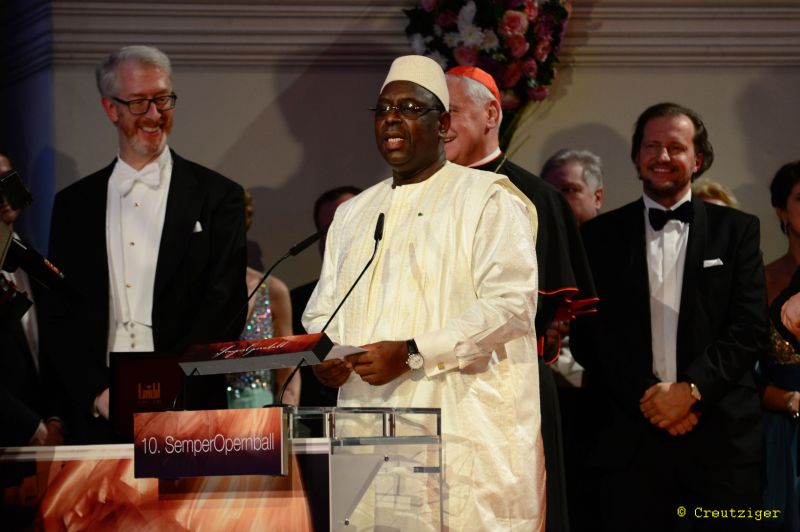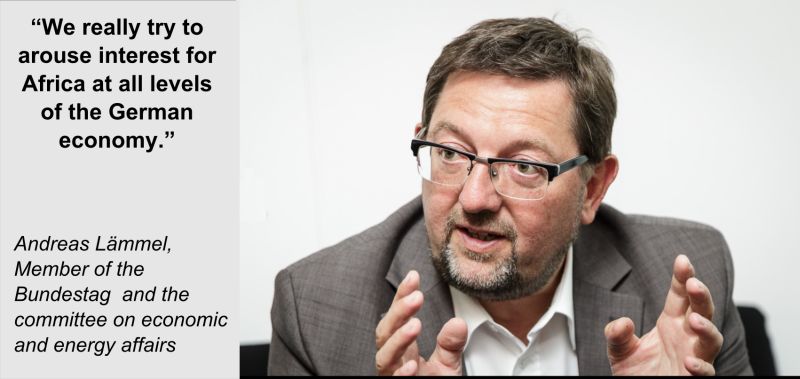2nd part of the interview with the Member of the Bundestag Andreas Lämmel and member of the committee on economic and energy affairs
You speak of a Berlin company with German funding. But there is also the German Society for International Cooperation (GIZ) with agencies in many African countries and projects in the field of energy. Can attempts be made to also offer such solutions through GIZ? In the end, German subsidies are concerned here .
Andreas Lämmel: GIZ actually makes an important contribution. But, to be honest, I must say that in my opinion private models are much more expedient. What I mean are projects arising from the private industry and backing a long-term existence of the company. I consider this to be more expedient than anything else.
Now, can you imagine that this Berlin company will initiate a pilot project in Senegal as well?
Andreas Lämmel: The government promotes such projects, so as to enable a company to continue making commercial use of a concrete project. This is the reason why we support the project now, in order to bring it to series maturity. Thereafter the company must sell the product by itself. And why should the company refrain from offering the product in Senegal? However, I discussed this matter with the managing directors. Everywhere there is still the problem of storage. When it starts getting dark, there is no solar electricity. Hence, the relevant issue is storage. Then, there are the accounting systems. I found advanced technologies and suitable solutions in the Internet. In Africa too, a lot is happening in the area of the Internet. So, when this technology is really functioning and utilisable, a giant leap forward has in my view been taken.
I now give you a further example. In Africa, there are currently 600 million mobile phones, with rising tendency. This means that many Africans did not get to know any landline telephone system. They immediately changed over to mobile phones. And if the trend of decentralisation continues in the energy supply, many Africans will inevitably only get to know electricity from renewable energies. Especially in rural areas, where there are no electric cables, the Africans will from one day to the next be exclusively supplied with electricity from renewable energies through island solutions. This situation could develop into a huge market for German suppliers.
Andreas Lämmel: That's right. But as I said, the technology is still very expensive. A major obstacle for the application of this technology in Africa is indeed that many African governments say: That is all too expensive for us; nobody here can pay that much money.
The key issues are long-term goals. When you need electricity, but have no such electricity and decide in favour of solar power, you may incur high costs at the moment, but in the long term you will save a lot of money. Why should the development banks refrain from joining the payment systems while making sure that the consumers obtain the proper financing for solar energy plants and pay off the costs in monthly instalments, as if they still received a bill for electricity?
Andreas Lämmel: The consumer will not always have electricity, as the storage technology is the Achilles heel of the solar technology. Scientists and also economists tell us that within the next 15 up to 20 years there will be no storage units which are available, affordable and fulfil the intended purpose. The same problem also exists in Germany, as I already mentioned. We have a high capacity of installed renewable energies, but nevertheless cannot do without fossil and nuclear energy. As far as Africa is concerned, I think I share your opinion; we have a tremendous opportunity there. But the systems must become less expensive. With the Chinese entry onto solar production, the prices have fallen sharply. And I think, considerable progress will be achieved within the next few years already.
The prices can also be kept at a low level, when the production partially takes place on site.
Andreas Lämmel: The question, why there is no production in Africa, indeed arises in relation to numerous issues. That is correct. We have to consider that point. Let us see how things develop in the next few years. I feel that some processes can be realised on one's own initiative on site, and above all that significantly higher investments for technical training are needed, so as to give young people the chance of building up new business models. I do think that this whole issue of renewable energies can indeed by an opportunity for new business transactions. But not all prerequisites have been created in a way that short-term business can be done on a large scale. Well, I took a look at projects in Africa, where the important business steps had been implemented through development aid, similar to the exemplary test case of water supply with solar energy plants in villages. In the end, however, all solar panels were removed and replaced by the former diesel generators, simply because the solar panels failed to perform the output needed for properly filling the water tanks on a sustained basis. In the last few years many attempts were made, but I repeat that in my opinion the private industry shall preferably find its own business models. Development aid projects are, from my point of view, the second best projects.
And if we wait for the private industry, the way to Africa will presumably take a long time, which is the reason why we need some kind of promotion or at least information events in the form as organised by you with "Africa meets Business". Can you imagine to organise an Africa meets Business event on that topic in the near future?
Andreas Lämmel: In Ghana we have something similar to that. There is the "West African Renewable Energy Fair and Convention" in Ghana. We thus have a trade fair in Accra, especially dealing with the topic of renewable energies. In English, the term reads "WACEE". The initiators were Germans, who wanted to organise the fair jointly with Ghana. Actually, the trade fair is intended to achieve the objectives outlined by you in the whole of West Africa. We always strive to persuade German companies to participate in this trade fair, which unfortunately did not take place this year, due to the political uncertainties in Ghana. But these are precisely the circumstances showing how crucial it is to be on site, to demonstrate the technology, to locally find people who are interested in developing their own business models, just as to find and train young people meeting the required technical prerequisites. We will do our best to further develop this trade fair.
This brings us back to the topic of mining. Next year, on 4 November 2016, we will organise the 3rd German-Senegalese Economic Summit. Please feel invited, now already. But first we are planning a Mining Symposium to be held at the Freiberg University in your Land Saxony with the assistance of Dr. Reinhold Festge, President of VDMA. In how far would it be possible for you, acting as politician, to support this project?
Andreas Lämmel: In principle, you have come to the right place. Freiberg University is the first university of mining in the world, which is dedicated to the topic of mining at all. In Freiberg, we actually have a number of companies, which are engaged in Africa in the mining sector and in recultivating the mining landscapes. We even newly established a Resources Institute in Freiberg, which I believe would be a good opportunity for African experts to be supplied with information about the state of the art, or to make new contacts.
A Conference "Africa meets Business" with emphasis placed on Senegal. How do you feel about that?
Andreas Lämmel: We have to think about that. This year, I met Macky Sall, the President of Senegal, on 30 January in Dresden. We must reflect on how to conceptually shape the project; on how Senegal could present itself. That might be an appropriate occasion. We really try to arouse interest for Africa at all levels of the German economy. Arousing interest is the first step, since especially the German economy is clearly focused on Asia, the Arab countries and South America, and since many German entrepreneurs are somewhat afraid of Africa due to the often negative news coming from the African continent, although people are not aware of what problem is exactly concerned. If Ebola is existent in a few West African countries, then Ebola is supposed to be visible in the whole of West Africa. People simply do not see that Africa is a huge continent with 54 different countries. This is something I'm also discussing with the ambassadors in Berlin. What we should try to do, is to jointly make more publicity for African projects and convey more positive pictures of Africa.

Finally, do you know now already when your next "Africa meets business" event will take place?
Andreas Lämmel: In March 2016.
Mr. Lämmel, thank you for the Interview.
Interview conducted by Ibrahim Guèye.





